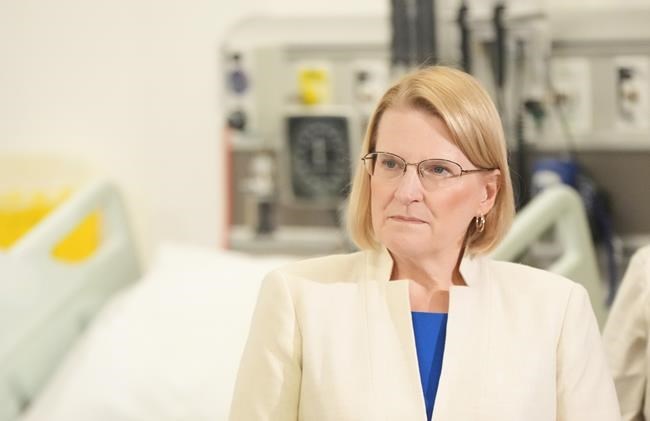TORONTO — Recruitment and retention of doctors in Ontario is "not a major concern," the Ministry of Health suggests in arguments it is making in arbitration with the Ontario Medical Association over physician compensation.
The argument from the province comes as the OMA, which represents Ontario's doctors, has repeatedly warned that more than two million residents don't have a family doctor and thousands of physician jobs are going unfilled.
The province is in the midst of negotiations with the OMA for the next Physician Services Agreement, which determines how doctors are compensated, covering the next four years.
But the talks are going so poorly that an arbitrator is now being asked to determine compensation levels for the first year while the two sides work on the 2025-2028 period, one of the doctors involved said.Â
"Things are in such dire shape that that's the fastest way to get money out the door to stabilize family doctors' practices," said Dr. David Barber, chair of the OMA's Section on General and Family Practice.
The government's arguments in its arbitration brief are unlikely to improve relations, he said.
"It's really quite insulting," Barber said.
"The numbers are one thing, right, but ... the government's approach here is their briefing essentially says there's nothing wrong. I get there's posturing, but this is actually quite dangerous posturing on the side of the government."
The OMA is proposing a five per cent general price increase for the year, a 10.2 per cent "catch up" to account for inflation and "low price increases" since 2012, as well as 7.7 per cent to be directed to various health system programs.
In comparison to the 15.2 per cent in direct increases the OMA is proposing, the Ministry of Health is proposing three per cent. There is no need for any "catch up," it argues.
"The average physician income adjustments compared favourably with other settlements where retention and recruitment is not a major concern," the ministry wrote.
"We will illustrate that there is no concern of a diminished supply of physicians. Across Canada, Ontario has the best record in attracting medical graduates to train in Ontario. Further, Ontario has enjoyed a growth in physicians that far outstrips population growth."
Health Minister Sylvia Jones said the ministry is not saying retention is not a big issue, nor is it saying there is no doctor shortage.
"What we're saying is that Ontario physicians are a really important part of our health-care system, and we'll continue to work with them to grow the workforce," she said Wednesday after question period.
"We've done that through commitments to two new medical schools. We've done that through expanding residency positions ... in fact, the interest to practice and work in the province of Ontario is high."
The ministry's arbitration submission cited various data points to back up its arguments. The supply of doctors has grown 8.9 per cent from 2019-20 to 2023-24, while the population grew 7.1 per cent, it said.Â
In that same time period, the average income of a physician increased by about 10 per cent, while the average patient encounters per physician dropped 3.7 per cent, the ministry said.
"It is concerning that while physician incomes have been rising, and the number of physicians outpaces population growth, patient access appears to have worsened," the ministry wrote.
"Why are the number of physicians increasing, yet physician services decreasing? It could be the desire by physicians for greater work-life balance."
The ministry argues that an agreement for doctors should be approached differently than for nurses, where a recent deal put shortages "front and centre."
The government also says many initiatives are underway to increase patient care and access to family doctors.
"These considerations are particularly relevant when the (arbitrator) considers issues such as retention and recruitment of physicians," it wrote. "There is an entirely different consideration for this hearing than there was in the recent health-care decisions in hospitals."
The OMA's arguments also contain a multitude of numbers. There are 2.3 million Ontario residents without a family doctor, they argued. Using a calculation involving census data the province is short more than 2,000 doctors, they said. Data from government agency Health Force Ontario show more than 3,000 physician job vacancies, they said. As well, Ontario has 234 doctors per 100,000 population, one of the lowest rates in the country.
"Ontario is facing a physician human resources crisis," the OMA wrote.Â
"The evidence of this is everywhere. It can be seen, for example, in the unprecedented number of patients unattached to a family physician, the closures and crowding of emergency departments, the long wait lists to see a specialist, and the backlog of surgical procedures and diagnostic imaging in the post-pandemic era."
The Ontario College of Family Physicians said in a statement Wednesday that while it is the OMA's role, and not theirs, to negotiate, the college as an advocate for family doctors agrees with the OMA that the government's compensation proposal would "further exacerbate" a crisis.
"Compensation has not kept pace with inflation and does not reflect the increasingly complex care they provide," the college wrote.
"The Ontario government must recognize the essential role of family doctors. The care and expertise they provide cannot be replaced, and compensation should reflect their true value to patients and the health system."
NDP health critic France Gelinas said the government needs to work with doctors to address the issues that are driving physicians out of family medicine.
"Over two million people in Ontario don't have a doctor," she wrote in a statement. "Instead of trying to solve this problem, the government wants to ignore it."
This report by The Canadian Press was first published May 8, 2024.
Allison Jones, The Canadian Press




